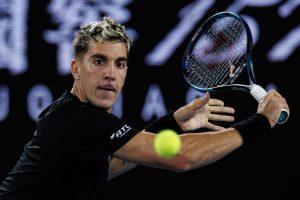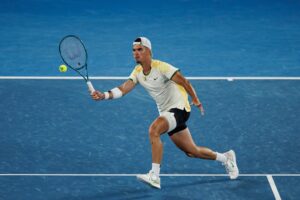Hubert Hurkacz won the Delray Beach Open this week, defeating up-and-comer Sebastian Korda 6-3 6-3. The Pole had waited over a year to win his second ATP title after winning his first in Winston-Salem in August 2019. After a relatively disappointing 2020, Hurkacz will hope to use this win as a springboard to a more successful season.
Korda was contending his first, but surely not his last, ATP final at 20 years old. He won his first Challenger title in Eckental in the previous event he had played. Korda will likely take confidence in continuing a steady upward trajectory, though will ultimately be disappointed not to have won.
Hurkacz had won nine out of his last 21 matches going into the tournament. What did he do to snap this run of poor form? What could Korda have done differently to take that extra leap in his career? We look to answer these questions by analysing the final.
Hurkacz steps up on serve and return
Hurkacz was a cut above his opponent on serve in the Delray Beach Open final. He may have dropped his first service game to love but after this, he never looked back (this was not due to his serving performance as such, he was just tight from the baseline).
Hurkacz hit an average first serve speed of 114.6mph, perhaps slightly below average for being 6.5” in height, but still quick enough to make an impact. When he did take some speed off of the serve, his placement was often impeccable, even hitting a 99mph ace out wide on the deuce court. His first serve prowess meant that only 37.5% of his serves were returned by Korda.
With his serve being handily taken care of, the pressure was constantly on Korda to hold serve. Conversely to his own serve, by getting 68% of Korda’s first serves back into play, Hurkacz persistently asked the American to find a groundstroke that would win him the point, a level of play that Korda could not consistently execute. From 2-3 down, Hurkacz broke Korda in four of his next seven service games.
There was nothing particularly extraordinary about Hurkacz’s performance, but decent numbers on serve and consistency on the return eventually broke down Korda’s defences.
More to be desired in serve placement and aggressive tactics from Korda
Korda’s average serve speed was 110.4 mph, 4 mph less than Hurkacz’s and markedly slow for being 6.5” in height. His serve needed improvement last year and, though it is slightly faster than before, there is still work to be done to gain an additional few miles per hour.
More important than the speed, his serve placement could be improved. His serves were rarely close enough to the lines to trouble Hurkacz, as he hit one ace throughout the entirety of the match. This is also what accounted for Hurkacz’s high return rate. On both first and second serves, only 15.4% of Korda’s serves went unreturned; Hurkacz went 52.1% on unreturned serves.
Finally, Hurkacz went down an early break in all of his matches except his first round. Korda was aggressive enough to capitalise on Hurkacz’s slow start from the baseline but he arguably took his foot off the gas a little following this, allowing Hurkacz to work his way into rallies. He could have thrown in a few serve and volleys and gone for more on his groundstrokes to stop Hurkacz from getting any rhythm. In fairness to Korda, he hit 11 winners to Hurkacz’s four throughout the match, so he had some success with this tactic. He was not consistent enough however, and failed to execute a winning shot on too many occasions.
Hurkacz’s future
Of course, Hurkacz will be happy to have won his first title in a while, but he will not be getting ahead of himself. His opponents this week were all ranked outside the top 100 and between them, had won a combined total of 25 matches at the ATP level in a combined total of over 20 years of professional tennis.
This week’s performance from the Pole was fairly routine and is unlikely to be a winning formula against the very best in the world over five sets. This is reinforced by Hurkacz’s inability to step up at the Slams throughout his short career. His furthest run at a Slam was a third round showing at Wimbledon in 2019 where he lost to eventual champion Novak Djokovic. He has compiled an under-par 6-10 record at Grand Slam level.
Hopefully. Hurkacz can build on the confidence gained from winning in Delray Beach to continue to blast his opponents off of the court over a best of three format. Based on his performance this week however, he may not quite be ready to make that leap to winning a best of five set match against a top ten opponent.
Main photo:
Embed from Getty Images






